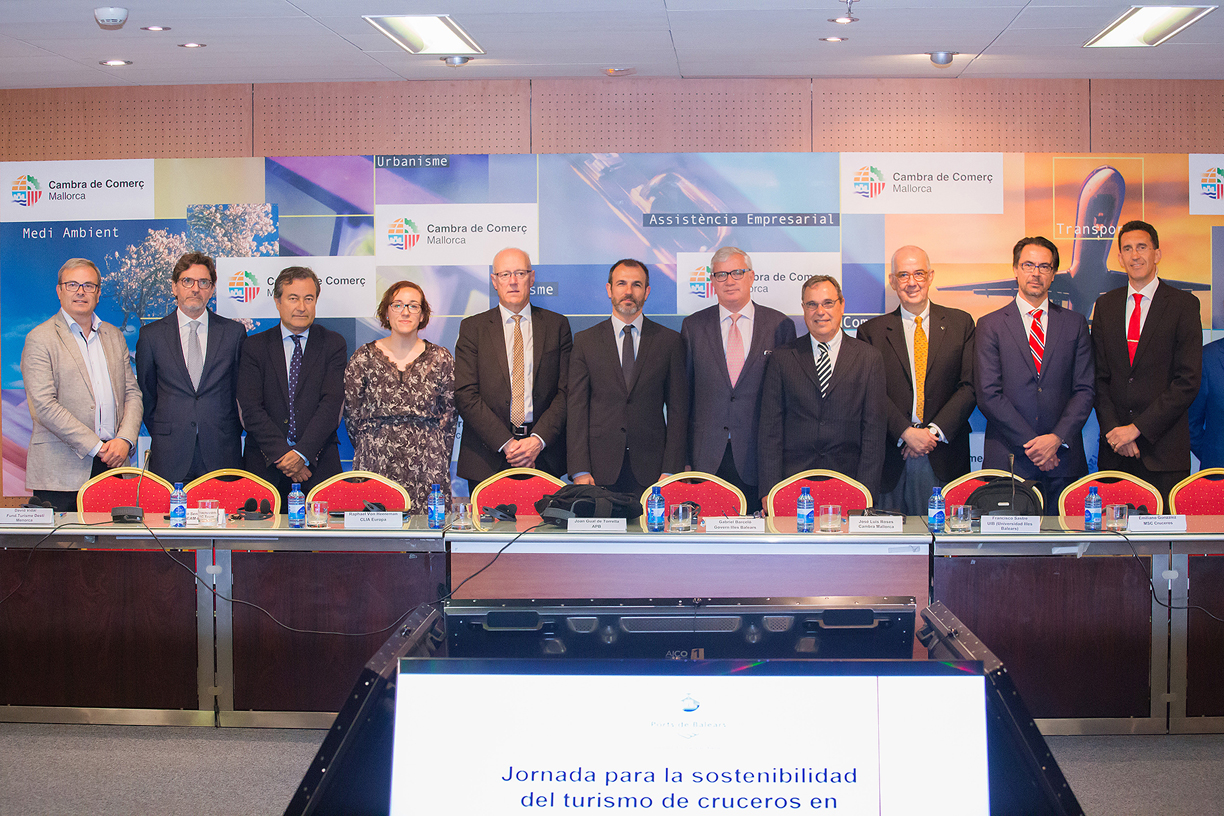
The institutions of the Balearic Islands and the private sector will work in a joint strategic plan for cruise ships
Palma
12/05/2016
The public institutions of the Balearic Islands and the private sector have agreed to work in a joint strategic plan to develop the cruise tourism in a sustainable manner and for the benefit of the economy of the islands. The decision has been taken in a meeting celebrated this morning in the headquarters of the Chamber of Commerce of Majorca and organised by the Balearic Islands' Port Authority (APB) and the Cruise Lines International Association CLIA.
This meeting has been attended by around 50 people from different sectors related to the tourism of the islands, including institutional representatives such as the vice president and Minister of Tourism of the Government of the Balearic Islands, Gabriel Barceló; the president of Ibiza Island Council, Vicent Torres; the Councillor of Tourism of Palma's city council, Joana Adrover; the first deputy mayor of Mahon's council, Vicenç Tur or the Councillor of Tourism of Alcudia, Joan Vallori.
The private companies have been represented by shipping lines such as Pullmantur, Aida, Carnival or MSC; tour operators such as TUI, hotel associations of Playa de Palma and Alcudia, the Provincial Association of Enterprisers of Balearic Maritime Activities APEAM, the Restoration Association of Majorca, associations of taxi drivers, etc.
All of them have been analysing for almost five hours the social and economic impact of cruise ships, and have agreed on their importance for the social structures of the Balearic Islands. Therefore they have decided to organise work groups in order to collaborate and set up a joint strategy with a main aim: to strengthen the tourist product represented by cruise tourism in a sustainable manner.
Joint support
The president of the APB, Joan Gual de Torrella, has highlighted that cruise ships are a com-plementary product of the tourist offer of the Balearic Islands which benefits the global econ-omy of the islands. The vice president of the Government of the Balearic Islands and Minister of Tourism, Gabriel Barceló, has expressed his opinion along the same lines and has supported the sector, highlighting the fact that it must be a sustainable product "from two points of view", the environmental and for the need to continuously regulate the passenger traffic.
For his part, Raphael von Heereman, the Secretary General of CLIA Europa, which comprises 50 cruise companies, has put the spotlight on the satisfaction level of tourists who visit the island and become the target public of the destination, and has highlighted the need to celebrate a meeting such as this in order to offer a sustainable future to cruise ships and tourism in the Balearic Islands.
The president of CLIA in Spain, Alfredo Serrano, has also stated that "regions such as the Balearic Islands are essential for the development of the cruise industry, with doorways such as Palma, one of the most important ports of Europe, and other ports of the archipelago which have grown considerably in the last few years and have a great growth potential”. From CLIA they have offered their full collaboration with the authorities, ports, travel agencies and shipping companies "with the aim of promoting the sustainable development of the Balearic Islands and of strengthening the cruise industry so that it keeps being beneficial to the economy of the area".
Some figures
The ports of the Balearic Islands managed by the APB are the third ones in the Mediterranean in number of cruise passengers —with almost two millions— and the second ones in number of calls registered in 2015, with almost 790, only surpassed by the Italian port of Civitavecchia.
Regarding the economic and social impact, according to a study carried out by the UIB and the CAEB in 2011, the impact of cruise ships on the economy of the Balearic Islands is of 290 million euros in annual turnover, 146 million euros of GDP contribution and 3.000 jobs. Nonetheless, cruise tourism only represents the 3% of the annual tourism of the Balearic Islands.
Palma's Port is positioned as a base port in the Mediterranean, Alcudia for smaller and more exclusive cruise ships. Mahon is positioned as a boutique port in the Mediterranean, although it can receive ships of more than 200 metres in length. And Ibiza's Port will be the one to grow the most and to receive the longest stays this season, as cruise passengers spend the night in the island.







